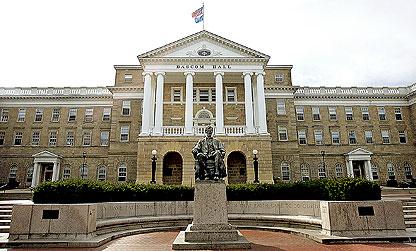A two-year extension to the University of Wisconsin System tuition freeze would mean trimming the fat in UW’s budget.
Even with the uncertainty surrounding the likelihood of such an extension, UW is currently preparing deans of administrative units across campus for the possibility of budget cuts anywhere between 2 to 6 percent.
For the past year UW was able to reduce the impact on administrative units from these cuts by spending fund balances for programs and services across campus, Chancellor Rebecca Blank said in an interview with The Badger Herald.
“We can’t continue to fill the budget gaps with fund balances,” Blank said. “At the end of this fiscal year, our tuition fund balances will have declined almost by half. With no change in the budget, we will need to cut a little more than 4 percent from all of our state and tuition-funded programs.”
John Scholz, dean for the College of Letters and Science, said this is a difficult task for administrative units because there is no longer “fat to trim.” The College of Letters and Science already went through an 8 percent budget cut in 2008-2009, he said.
“The lion’s share of the L&S budget goes to people,” Scholz said. “So budget cuts necessarily mean there will be a reduction in people. Whatever fat was there, is long out of the budget. By not filling positions that become vacant we will offer fewer courses, attract fewer external research dollars and reduce services that students rely on.”
All departments and units on campus could potentially be affected by budget cuts should the exercise become effective in reality, Susan Zaeske, associate dean for the arts and humanities, said.
However, one department that could potentially feel the squeeze of budget cuts is the Department of East Asian Languages and Literature.
“At this point it hasn’t had an impact on the day-to-day workings of the department because the day-to-day funds that we spend in the department are already budgeted,” Rania Huntington, chair of the Department of East Asian Languages and Literature, said. “I think that the concern is for the future.”
The main concern of EALL is a change in the number of teaching assistant positions funded next semester.
Access funding allows for the means to open additional sections of classes when there is high enrollment for a certain class. EALL often needs to do this for some of the more popular language classes, Huntington said.
“What budgets cuts could potentially do, and this isn’t happening yet, but possibly fewer sections of highly in demand courses would be offered,” Huntington said. “Section size is especially crucial in our language classes because East Asian languages is challenging and students need a lot of opportunity to practice. When a section gets large, the opportunities for each individual student to speak and practice their language and have direct help from their professor or TA get reduced.”
Students would be affected in the EALL department if budget cuts are applied because fewer sections for popular courses may be available. This could either mean that students were in a larger section or that there were sections available at fewer times so fewer students would be able to fit these classes into their schedule.
The second concern of the EALL is that anything the department would like to ask the administration for that would require an additional investment of funds would be denied.
“So we have to make sure that we’re really asking for the things that are most important to us and that we’re making as strong of a case as we possibly can,” Huntington said.


